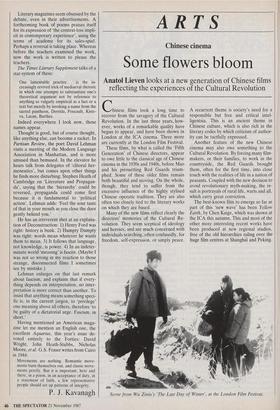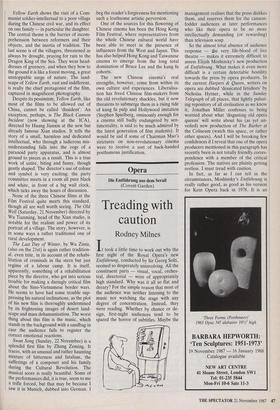ARTS
Chinese cinema
Some flowers bloom
Anatol Lieven looks at a new generation of Chinese films reflecting the experiences of the Cultural Revolution Chinese films took a long time to recover from the savagery of the Cultural Revolution. In the last three years, how- ever, works of a remarkable quality have begun to appear, and have been shown in London at the ICA cinema. Three more are currently at the London Film Festival.
These films, by what is called the 'Fifth Generation' of Chinese directors, appear to owe little to the classical age of Chinese cinema in the 1930s and 1940s, before Mao and his pirouetting Red Guards trium- phed. Some of these older films remain both beautiful and moving. On the whole, though, they tend to suffer from the excessive influence of the highly stylised Chinese operatic tradition. They are also often too closely tied to the literary works on which they are based.
Many of the new films reflect clearly the directors' memories of the Cultural Re- volution. They seem sceptical of ideology and heroics, and are much concerned with individuals searching, often confusedly, for freedom, self-expression, or simply peace. A recurrent theme is society's need for a responsible but free and critical intel- ligentsia. This is an ancient theme in Chinese culture, which is also rich in the literary codes by which criticism of author- ity can be tactfully expressed.
Another feature of the new Chinese cinema may also owe something to the Cultural Revolution. By forcing many film- makers, or their families, to work in the countryside, the Red Guards brought them, often for the first time, into close touch with the realities of life in a nation of peasants. Coupled with the new decision to avoid revolutionary myth-making, the re- sult is portrayals of rural life, warts and all, which carry great conviction.
The best-known film to emerge so far as part of this 'new wave' has been Yellow Earth, by Chen Kaige, which was shown at the ICA this autumn. This and most of the other more interesting recent works have been produced at new regional studios, free of the old hierarchies ruling over the huge film centres at Shanghai and Peking.
Scene from Wu Ziniu's 'The Last Day of Winter', at the London Film Festival. Yellow Earth shows the visit of a Com- munist soldier-intellectual to a poor village during the Chinese civil war, and its effect on one family — in particular the daughter. The central theme is the barrier of incom- prehension between reformers and their objects, and the inertia of tradition. The last scene is of the villagers, threatened as always by drought, praying for rain to the Dragon King of the Sea. They wear head- dresses of greenery, and when they bow to the ground it is like a forest moving, a great unstoppable surge of nature. The land- scape of Yellow Earth, vast and indifferent, is really the chief protagonist of the film, captured in magnificent photography.
Despite its pessimism, Yellow Earth, like most of the films to be allowed out of China, cannot be called 'dissident'. An exception, perhaps, is The Black Cannon Incident (now showing at the ICA), directed by Huang Jianxin at the new but already famous Xian studios. It tells the story of a small, harmless and dedicated intellectual, who through a ludicrous mis- understanding falls into the cogs of a paranoid party apparatus, and is almost ground to pieces as a result. This is a true work of satire, biting and funny, though gently shaped. The director's use of colour and symbol is very exciting: the party committee meets in a room all pure black and white, in front of a big wall clock, which ticks away the hours of discussion.
None of the three Chinese films at the Film Festival quite meets this standard, though all are well worth seeing. The Old Well (Saturday, 21 November) directed by Wu Tianming, head of the Xian studio, is notable for the realism and power of its portrait of a village. The story, however, is in some ways a rather traditional one of rural development.
The Last Day of Winter, by Wu Ziniu, (also on the 21st) is again rather tradition- al, even trite, in its account of the rehabi- litation of criminals in the stern but just regime of a labour camp. It is itself, apparently, something of a rehabilitation piece by the director, who got into serious trouble for making a daringly critical film about the Sino-Vietnamese border wars. He seems to have had some trouble sup- pressing his natural inclinations, as the plot of his new film is thoroughly undermined by its frightening images of desert land- scape and mass dehumanisation. The worst thing about this film is the music, which stands in the background with a sandbag in case the audience fails to register the correct emotional reactions.
Swan Song (Sunday, 22 November) is a Splendid first film by Zhang Zeming. It traces, with an unusual and rather haunting mixture of bitterness and fatalism, the sufferings of a composer and his family during the Cultural Revolution. The musical score is really beautiful. Some of the performances did, it is true, seem to me a trifle forced, but that may be because I saw it in Munich, dubbed into German. I beg the reader's forgiveness for mentioning such a loathsome artistic perversion.
One of the sources for this flowering of Chinese cinema has been the Hong Kong Film Festival, where representatives from the whole Chinese cultural world have been able to meet in the presence of influences from the West and Japan. This has also helped Hong Kong and Taiwanese cinema to emerge from the long total domination of Bruce Lee and the kung fu cohorts.
The new Chinese cinema's real strengths, however, come from within its own culture and experiences. Liberalisa- tion has freed Chinese film-makers from the old revolutionary shackles, but it now threatens to submerge them in a rising tide of kung fu pulp and Hollywood imitation (Stephen Spielberg, ominously enough for a cinema still badly endangered by sen- timentality, is said to be much admired by the latest generation of film students). It would be sad if some of Chairman Mao's strictures on non-revolutionary cinema were to receive a sort of back-handed posthumous justification.



































































 Previous page
Previous page